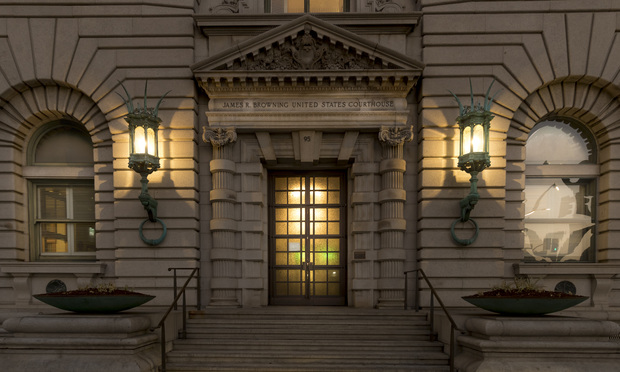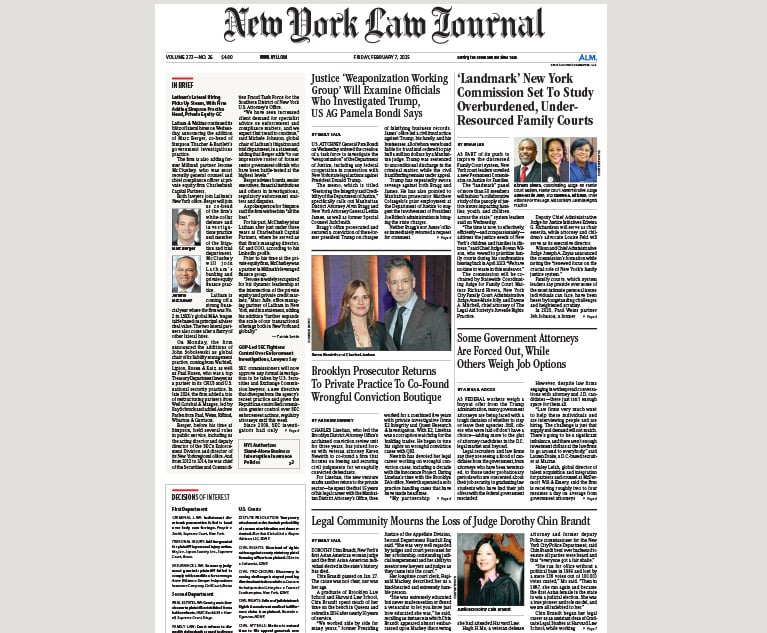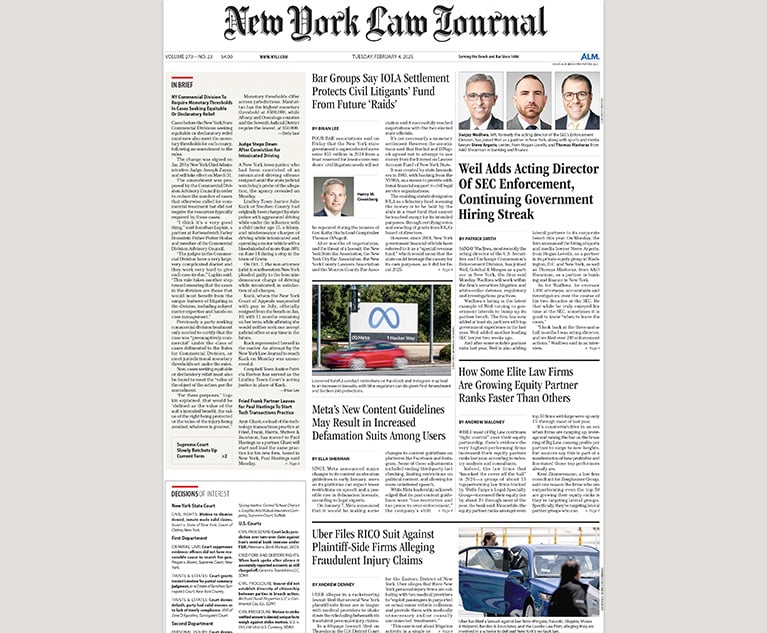9th Circuit Certifies Question to NY Court of Appeals in Litigation Funding Suit
The certified question from the U.S. Court of Appeals for the Ninth Circuit asked the New York Court of Appeals to decide whether the arrangement qualified as a "loan" or "cover for usury" under a state statute, which caps the amount of interest that can be charged for lending.
June 11, 2020 at 06:25 PM
3 minute read
 U.S. Court of Appeals for the Ninth Circuit in San Francisco. (Photo: Jason Doiy/ALM)
U.S. Court of Appeals for the Ninth Circuit in San Francisco. (Photo: Jason Doiy/ALM)
A San Francisco-based federal appeals court asked the highest court in New York to decide whether a litigation funding agreement requiring the repayment of attorney fees in unrelated cases runs afoul of the state's usury laws.
The certified question from the U.S. Court of Appeals for the Ninth Circuit asked the New York Court of Appeals to decide whether the arrangement qualified as a "loan" or "cover for usury" under a state statute, which caps the amount of interest that can be charged for lending.
If so, the Ninth Circuit asked, what, if any, consequences should a litigation financier face?
"Applying these state-law doctrines to a novel type of contract—secured financing agreements like the ones in this case—is a job most suitable for the highest court of the state whose law is in question," a three-judge panel of the federal appeals court wrote in a 25-page order.
"This is particularly the case when, as here, the result is likely to have wide-reaching implications. Litigation financing is a rapidly growing industry," the order said.
The question stemmed from Santa Rosa, California, attorney Richard Sax's appeal of a lower court's decision rejecting his claims that a series of contracts he entered with litigation funder Fast Trak Investment Co. were unenforceable as usurious loans.
According to court documents, the agreements included conditional payment obligations for separate cases, which "well exceed" New York's civil statutory maximum of 16% interest per year, as well as the 25% annual cap under the state's criminal usury statutes—meaning that if the contracts did indeed qualify as loans, they would all be void and unenforceable.
Sax had said that unless he lost all of his other cases, Fast Trak would still be able to collect on matters unrelated to the litigation it had funded, potentially draining his firm and sending him into bankruptcy.
A district court judge had ruled against Sax, finding that the contracts, "however unconscionable," did not meet the criteria to be considered loans under New York Law.
On Thursday, however, the Ninth Circuit panel said the New York Court of Appeals had never directly addressed the issue, and without controlling precedent, the judge were unable to predict how the court might rule.
"Whether New York law permits a defense of usury in these circumstances is a question for which no controlling precedent of the Court of Appeals exists. Because the resolution of this question will determine the result of this case, we believe certification is proper," the panel said.
The case in the Ninth Circuit, captioned Fast Trak v. Sax, has been stayed pending a decision by the New York Court of Appeals on whether it will take up the question.
READ MORE:
Second Circuit Certifies Question on Private Right to Sue Over Medical Records Overcharges
In OT Wage Case, 2nd Circuit Asks NY Court of Appeals to Resolve Claim Preclusion Issue
N.Y. Court of Appeals Poised To Resolve Split Over Bad Faith Suits Against Insurers
This content has been archived. It is available through our partners, LexisNexis® and Bloomberg Law.
To view this content, please continue to their sites.
Not a Lexis Subscriber?
Subscribe Now
Not a Bloomberg Law Subscriber?
Subscribe Now
NOT FOR REPRINT
© 2025 ALM Global, LLC, All Rights Reserved. Request academic re-use from www.copyright.com. All other uses, submit a request to [email protected]. For more information visit Asset & Logo Licensing.
You Might Like
View All
'A Shock to the System’: Some Government Attorneys Are Forced Out, While Others Weigh Job Options
7 minute read
Haynes and Boone Expands in New York With 7-Lawyer Seward & Kissel Fund Finance, Securitization Team
3 minute readTrending Stories
- 1Munger, Gibson Dunn Billed $63 Million to Snap in 2024
- 2January Petitions Press High Court on Guns, Birth Certificate Sex Classifications
- 3'A Waste of Your Time': Practice Tips From Judges in the Oakland Federal Courthouse
- 4Judge Extends Tom Girardi's Time in Prison Medical Facility to Feb. 20
- 5Supreme Court Denies Trump's Request to Pause Pending Environmental Cases
Who Got The Work
J. Brugh Lower of Gibbons has entered an appearance for industrial equipment supplier Devco Corporation in a pending trademark infringement lawsuit. The suit, accusing the defendant of selling knock-off Graco products, was filed Dec. 18 in New Jersey District Court by Rivkin Radler on behalf of Graco Inc. and Graco Minnesota. The case, assigned to U.S. District Judge Zahid N. Quraishi, is 3:24-cv-11294, Graco Inc. et al v. Devco Corporation.
Who Got The Work
Rebecca Maller-Stein and Kent A. Yalowitz of Arnold & Porter Kaye Scholer have entered their appearances for Hanaco Venture Capital and its executives, Lior Prosor and David Frankel, in a pending securities lawsuit. The action, filed on Dec. 24 in New York Southern District Court by Zell, Aron & Co. on behalf of Goldeneye Advisors, accuses the defendants of negligently and fraudulently managing the plaintiff's $1 million investment. The case, assigned to U.S. District Judge Vernon S. Broderick, is 1:24-cv-09918, Goldeneye Advisors, LLC v. Hanaco Venture Capital, Ltd. et al.
Who Got The Work
Attorneys from A&O Shearman has stepped in as defense counsel for Toronto-Dominion Bank and other defendants in a pending securities class action. The suit, filed Dec. 11 in New York Southern District Court by Bleichmar Fonti & Auld, accuses the defendants of concealing the bank's 'pervasive' deficiencies in regards to its compliance with the Bank Secrecy Act and the quality of its anti-money laundering controls. The case, assigned to U.S. District Judge Arun Subramanian, is 1:24-cv-09445, Gonzalez v. The Toronto-Dominion Bank et al.
Who Got The Work
Crown Castle International, a Pennsylvania company providing shared communications infrastructure, has turned to Luke D. Wolf of Gordon Rees Scully Mansukhani to fend off a pending breach-of-contract lawsuit. The court action, filed Nov. 25 in Michigan Eastern District Court by Hooper Hathaway PC on behalf of The Town Residences LLC, accuses Crown Castle of failing to transfer approximately $30,000 in utility payments from T-Mobile in breach of a roof-top lease and assignment agreement. The case, assigned to U.S. District Judge Susan K. Declercq, is 2:24-cv-13131, The Town Residences LLC v. T-Mobile US, Inc. et al.
Who Got The Work
Wilfred P. Coronato and Daniel M. Schwartz of McCarter & English have stepped in as defense counsel to Electrolux Home Products Inc. in a pending product liability lawsuit. The court action, filed Nov. 26 in New York Eastern District Court by Poulos Lopiccolo PC and Nagel Rice LLP on behalf of David Stern, alleges that the defendant's refrigerators’ drawers and shelving repeatedly break and fall apart within months after purchase. The case, assigned to U.S. District Judge Joan M. Azrack, is 2:24-cv-08204, Stern v. Electrolux Home Products, Inc.
Featured Firms
Law Offices of Gary Martin Hays & Associates, P.C.
(470) 294-1674
Law Offices of Mark E. Salomone
(857) 444-6468
Smith & Hassler
(713) 739-1250








